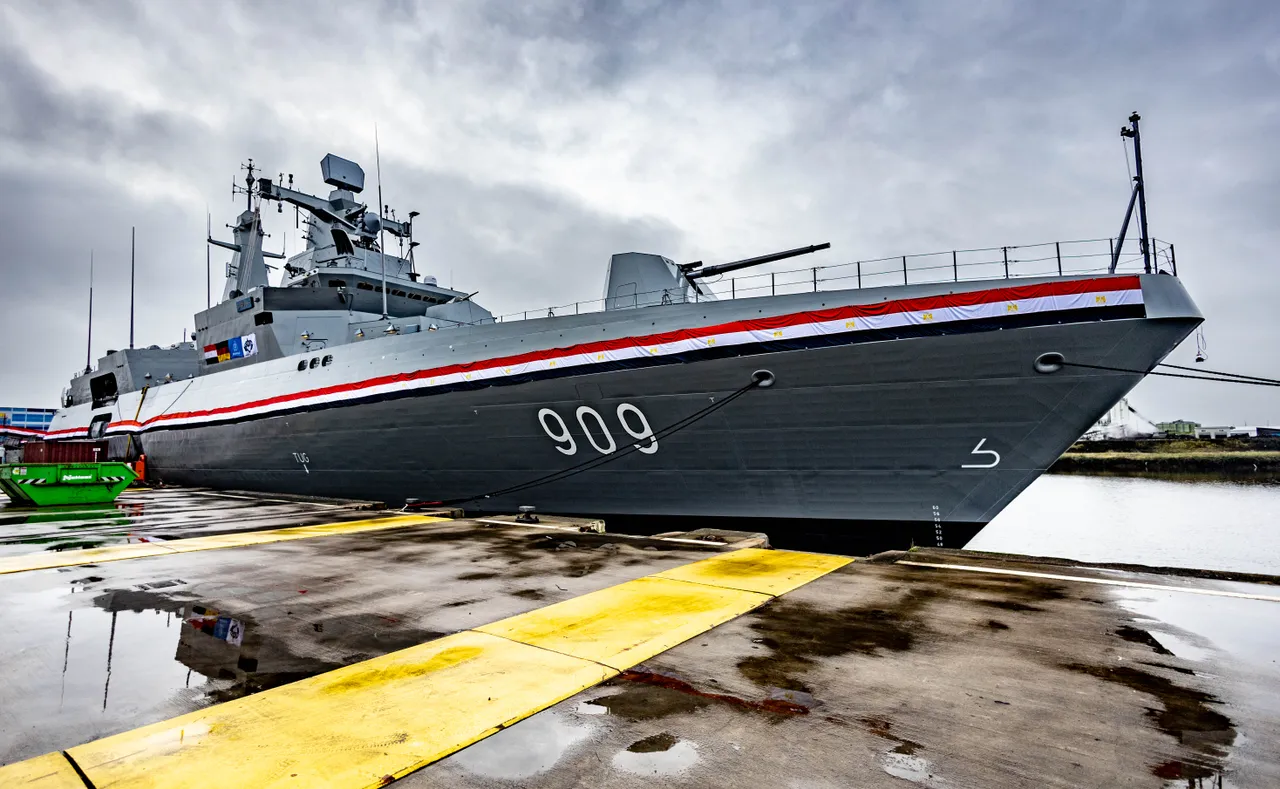In a festive ceremony held in Bremerhaven on 15 December, thyssenkrupp Marine Systems handed over the frigate “AL-QADEER” to the Navy of the Arab Republic of Egypt. “AL-QADEER” is the third in a series of four MEKO® A-200 EN frigates. The ceremony was attended by high-ranking representatives from the Egyptian and German Navy. Production work on “AL-QADEER” began with the first steel cutting in autumn 2020, followed by keel laying in March 2021, launching in April 2022, and naming in October 2022. In a few days, “AL-QADEER” will set sail for Alexandria, Egypt. Only a few days ago, at the Egyptian Defense Exhibition EDEX 2023 in Cairo, the fourth Frigate, AL-JABBAR, was launched for an expected delivery in October 2025.” In 2018, the Arab Republic of Egypt commissioned thyssenkrupp Marine Systems to build a total of four identical ships. The first three units – “AL-AZIZ”, “AL-QAHHAR” and “AL-QADEER” – were built in Germany, while the fourth frigate is currently under construction at Alexandria Shipyard in Egypt.
Vice Admiral Ashraf Ibrahim Atwa, Commander in Chief of the Egyptian Navy said: “Within only 14 months, the Egyptian Navy received the three MEKO® A-200 Frigates AL-AZIZ, AL-QAHHAR and AL-QADEER. These repeated visits for the handovers are the actual proof of the extent of cooperation and friendship between the Arab Republic of Egypt and the Federal Republic of Germany. As much the Egyptian Navy is proud to acquire the MEKO® A-200 frigates, thyssenkrupp Marine Systems must also be proud for building them.
Oliver Burkhard, CEO of thyssenkrupp Marine Systems highlighted: “Just six months after the handover of the second frigate, ‘AL-QAHHAR’, another state-of-the-art ship was successfully delivered to the Egyptian Navy today. The handover marks the official completion of construction of the ships in Germany, all in record time. The fourth frigate will be completed at Alexandria Shipyard in close cooperation with thyssenkrupp Marine Systems.”

The MEKO family of warships was developed by the German company Blohm+Voss. MEKO is a registered trademark. The portmanteau stands for “Mehrzweck-Kombination” (English: multi-purpose-combination). It is a concept in modern naval shipbuilding based on modularity of armament, electronics and other equipment, aiming at ease of maintenance and cost reduction. MEKO ships include families of frigates, corvettes and ocean-going patrol boats. Construction of MEKO ships began in the late 1970s with the design and later building of Nigeria’s MEKO 360 H1. Vessels of similar classes use different weapons systems. For example, for the main gun, some MEKO 200s use the Mk 45 Mod 2 gun, others use the French 100 mm naval gun or Otobreda 76 mm gun. The latest variant is the “Combat Ship for the Littorals” or MEKO CSL. It has also been called a “Littoral Combatant Ship”, but it is much smaller than the American Littoral Combat Ship (LCS).
The MEKO A-200 Frigate follows the famous MEKO 200 series general purpose frigates from the ThyssenKrupp stable. A fighting ship capable of full 4-dimensional warfare (AAW, ASW and ASuW, BCW), the MEKO A-200 Frigate is also designed for sustained operations across the full spectrum of general missions and tasks: patrol and interdiction, support of special force operations, SAR and humanitarian operations. The MEKO A-200 Frigate is a perfect example of the innovative propulsion, stealth and survivability design, robust sea-keeping and all-weather boat and helicopter operability that characterizes frigates from Marine Systems. The MEKO A-200 has greatly reduced radar, IR, acoustic and magnetic signatures to hide and stay hidden: The X-Form shell design; extensive bulwark screening of exposed equipment; flush-closing shell doors, and RCSnet screening of all shell openings, give the vessel very low radar cross-section. These different types of targets put different requirements on the radar; fighter jets require long-range, high diving missiles require elevation coverage, sea skimmers require fast reaction time, hovering helicopters require spectral information, UAVs are small and slow and require good clutter suppression, etc.
















